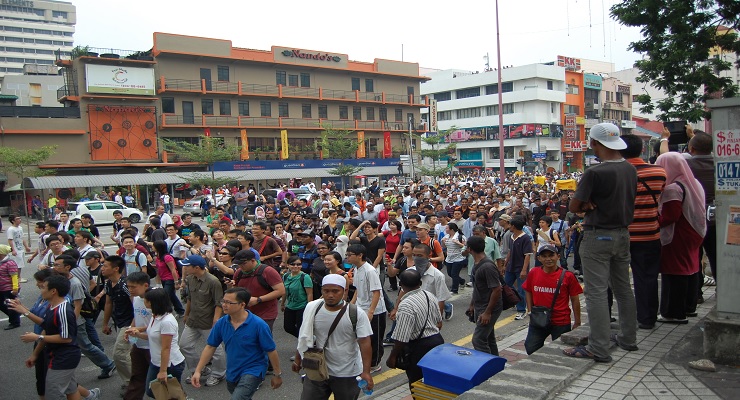
From Voice of America
Factional warfare has erupted on both sides of Malaysian politics as a bitter internal feud brings to a close the honeymoon period for the Pakatan Harapan (PH) coalition government.
Nurul Izzah Anwar’s shock resignation as a vice president of the People’s Justice Party (PKR) this week has exposed deep underlying divisions in a coalition forged between two political forces that for years stared at each other from opposite sides of the trenches.
The crux of the fighting centers around political maneuvering by Prime Minister Mahathir Mohamad that has raised concerns in some quarters he may renege on his pledge to hand over power to his former nemesis turned political ally Anwar Ibrahim.
PH is a coalition forged between Mahathir and Anwar, a former protege Mahathir turned on and jailed on controversial sodomy and corruption charges before the pair reunited to stage a staggering election victory in May ending more than six decades of single party rule in Malaysia.
While Nurul, Anwar’s daughter, has refused to elaborate on her resignation, recently defeated PKR deputy presidential candidate and close ally Rafizi Ramli publicly lambasted the PH leadership in a blog post Wednesday, declaring “the euphoria has gone somewhat sour.”
“I hate to be the bearer of bad news, but someone must bell the cat,” he wrote before pointing to plummeting opinion polls and outlining a raft of grievances with the party’s current direction.
Chief among them are Prime Minister Mahathir’s courting of defectors from his former party and PKR’s longtime enemies – the United Malays National Organization (UMNO) – into his new party Bersatu.
Rafizi attacked the notion that PH needs UMNO defectors because of its relatively weak standing with the country’s majority ethnic Malay population, arguing racial politics were a distraction from core voter concerns — their economic well being.
“We could achieve more if we focus on making sure the multiracial Malaysians get a fair treatment in every sphere of their life, regardless of race and religion,” Rafizi wrote.
Defections and succession rumblings
UMNO, which Mahathir led for two decades as prime minister before retiring in 2003, has been unable to resolve an existential crisis that has afflicted it since its shock electoral defeat in May.
The spectacular loss came as Prime Minister Najib Razak was dragged deeper and deeper into the multibillion dollar 1MDB corruption scandal, but was still almost universally unforeseen.
What could a party that had now been so glaringly exposed as a vast patronage network ruling for self-preservation claim to stand for in opposition?
“In the past 10 years or so at least UMNO has become largely a party of incumbency and advantage. So losing power immediately caused an existential crisis on them,” said Wong Chin Huat, a political scientist at the Penang Institute.
“Without the perks and patronage they could not retain their talents and supporters,” he added.
From retirement, the conservative nationalist Mahathir had re-emerged as the resurgent successor at the head of a coalition dominated by progressive opposition parties from the Reformasi movement he had long fought hard against.
Anwar’s support was predicated on an eventual transfer of power, which the 93-year-old Mahathir has repeatedly pledged to honor.
Recent UMNO defections to his party though have sowed the seeds of suspicion that Mahathir is strengthening his numbers in the parliament to sure up a freer hand in such decisions, said James Chin, director of the Asia Institute Tasmania at the University of Tasmania.
“You have to remember that when they got into government they don’t trust the old man because of the old man’s authoritarian ways. But the old man couldn’t do anything because his party was the second smallest. He only had 13 MPs on election night,” he said.
“Mahathir’s play is to make sure he can get up to somewhere between 30 to 40 MPs before he steps down so that the other two parties can’t bully him.”
He said there was a fear among PH coalition partners that Bersatu could become “UMNO 3.0.”
“Bersatu consists of people who are basically ex-UMNO. These people only know how to be in government to get benefit, so without that connection the party will cease to exist.”
Meanwhile trust concerns have reverberated through Kuala Lumpur’s “chattering class” over Anwar’s inability to consistently articulate what he stood for, Chin said.
“It’s very likely if Mahathir stepped down, he will bypass Anwar and go to his favorite candidate which is [Minister of Economic Affairs] Azmin Ali,” Chin said.
Of the 54 UMNO MPs elected to Malaysia’s 222 seat parliament in May, 17 have defected to join PH or become independents according the New Straits Times.
Mahathir’s staff declined to comment on the defections when contacted by VOA.
But he has told local media any UMNO defectors will be tightly scrutinized before they are accepted into the party.
Representatives of UMNO have also declined to comment, including prominent MP Khairy Jamaluddin, who was photographed on Wednesday having lunch with Nurul and Rafizi.
Since PH came to power, Malaysia has resembled a political fairy-tale that saw old foes unite to defeat a common enemy and push the country toward liberalization in a region dominated by autocrats.
Najib and his wife, Rosmah Mansor, are being brought to justice over 1MDB while sedition laws and the death penalty have been abolished.
Deep forces of political self-interest have now though, inevitably, resurfaced.
Leave a Reply